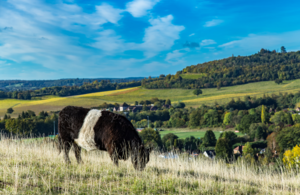Green Finance Boost for Nature in UK
New Green Finance Strategy and Nature Markets Framework to develop growth of green finance.

Government will encourage green finance for nature-based solutions.
Plans to accelerate investment in nature have been set out by the Government today (Thursday 30 March) as part of its drive to net zero by 2050.
The Green Finance Strategy published today will set out how the government will encourage green finance for nature-based solutions such as tree planting and peatland restoration and support farmers to access new private sector revenue streams whilst protecting our natural environment.
The government has set a target to raise at least £500 million in private finance to support nature’s recovery every year by 2027 in England, rising to more than £1 billion per year by 2030. This will support greater biodiversity and contribute to achieving our Environment Targets.
Environment Secretary, Thérèse Coffey MP said:
We need a healthy and thriving natural environment to meet our Net Zero goals and build our resilience to climate change.
Our announcement today sends a signal that the opportunities from investing in our farmland, forestry, peatlands and marine areas are great and offer long term rewards for people and nature.
Alan Lovell, Chair of the Environment Agency, said:
The appetite to invest in nature exists, and the Green Finance Strategy and the Nature Markets Framework will help unlock that potential and develop markets for a greener UK.
The Environment Agency is working with government to support private sector investment in climate adaptation and nature recovery, including through the Natural Environment Investment Readiness Fund. Financing work like nature-based flood alleviation schemes will help us reduce the economic costs of climate impacts in the coming decades.
Tony Juniper, Chair of Natural England:
A healthy environment and a vibrant economy go hand in hand. Green finance can unlock Nature’s solutions and help us meet a wide range of goals, from restoring clean water to promoting long term food security, and from resilience to climate change impacts to helping sustain public health. By going high Nature we can also help to go low carbon. Through setting standards and creating a clearer pathways for investment, we can achieve economic goals at the same time as environmental ones.
Measures set out to support green growth today include:
- An agreement that by 2024 farmers will be supported to better measure their emission sources through carbon audits and a harmonised approach to measuring carbon emissions.
- These changes will support farmers and land managers so they can earn income from Government led environmental land management schemes as well as attract finance from the private sector for sequestering carbon, improving water quality, and greater biodiversity alongside food production.
- Publishing a Nature Markets Framework, which sets out the government’s approach to supporting and accelerating growth of these markets and will enable revenue streams from different markets to be combined to support projects with multiple objectives for example increasing biodiversity and improving water quality. To date uncertainty about market development, how public funds interact with private markets, and tax impacts have limited long-term investment – the new Framework will help overcome this.
- Providing four pioneering local and combined authority areas (Cornwall; Northumberland, Cumberland, and Westmoreland & Furness; West Midlands Combined Authority; and York and North Yorkshire) with funding of up to £1 million each as part of the Local Investment in Natural Capital (LINC) programme. This two-year programme delivered by the Environment Agency and the four local authorities to test ‘what works’ in attracting investment into local priorities for nature.
- Working with the British Standards Institution (BSI) to develop a range of nature investment standards. Building on the experiences of the UK Woodland Carbon Code and UK Peatland Code, this will increase the range of trusted standards that market participants, including farmers and landowners, can use to access the nature markets.
Government has also set out today how it will support climate and nature action across the world with the publication of its 2030 Strategic Framework for international climate and nature action and International Climate Finance Strategy.
The 2030 Strategic Framework sets an ambitious vision for global climate and nature action up until 2030 to keep 1.5oC alive, build resilience to current and future climate impacts, and halt and reverse biodiversity loss. It will be supported by the new International Climate Finance (ICF) strategy that outlines our commitment to spend £11.6 billion of International Climate Finance between 2021/22 and 2025/26 to help developing countries mitigate, respond and adapt to the challenges of climate change, and has been at the forefront of tackling the twin challenges of nature loss and climate change globally.
During the UK’s presidency of COP26, more than 140 countries which are home to over 90 per cent of the world’s forests made a historic promise to halt and reverse forest loss and land degradation by the end of this decade. More recently, the UK played a leading role in helping to secure agreement to the ground-breaking COP15 Kunming-Montreal Global Biodiversity Framework to halt and reverse the destruction of nature.